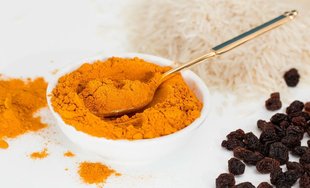Uncovering the truth about turmeric and ovarian cancer

What is the connection between turmeric and ovarian cancer?
Our Health Projects Manager investigates the truth behind recent claims that turmeric can prevent, treat or cure ovarian cancer ...
What is turmeric?
Turmeric is a spice that is commonly used as flavouring in Asian dishes.
What is being reported?
There have been many articles, stories and reports on social media suggesting that turmeric has been proven to prevent, treat and even cure ovarian cancer.
There have been many studies and trials carried out recently, and although results are promising, there is not yet enough evidence to prove that it can be used to successfully prevent or treat the disease.
Why is this being reported?
Across the world studies and trials are ongoing to help try and find the latest and most effective ways cancer can be prevented and treated.
Trials have been done show that curcumin, a chemical component of turmeric, can be effective in hindering the growth of, and shrinking tumours. They have also shown it may help stop pre-cancerous changes becoming cancer.
This is great news, isn’t it?
Not quite. Most positive evidence comes from trials on cells in laboratories, not in actual human patient cases.
Trials on humans have so far produced results which are not conclusive. Exactly how much curcumin needs to be absorbed for it to have an anti-cancer effect is not known yet, but it is more than the body can manage from either food or capsule sources.
So although the initial evidence looks promising, there is still a long way to go before turmeric can be considered as viable cancer treatment.
So, should I avoid using turmeric?
No. Turmeric itself is perfectly safe to consume, it is very commonly used to add colour and flavour things such as curries, mustard and cheese with no known side effects.
The long term effects of excessive consumption of turmeric are not well known, with reports of things such as stomach pain and skin problems reported in people that have consumed too much.
Turmeric supplements
Recently there has been a rise in online sales in the UK of turmeric based food supplement Fortodol (also sold as Miradin). Fortodol has been found to contain the strong anti-inflammatory drug nimesulide which can cause serious damage to the liver and is not licensed as a medicine in the UK.
The Food Standards Agency advises that you do not use these products, and anyone taking them to stop doing so immediately, and contact their doctor if they have any signs of liver disease. The signs include jaundice, dark urine, nausea, vomiting, tiredness, abdominal pain, or loss of appetite.
In summary ...
It is very rare for something such as a herb, type of food or supplement to be proven as an effective way to prevent or cure any type of cancer. But there are things that we know can help reduce risk. These include:
- Eating plenty of fruits and vegetables
- Being physically active
- Maintaining a healthy weight
- Limiting alcohol intake
- Not smoking
- Avoiding processed meat
Ovarian Cancer Action will always ensure we keep up to date and comment on any significant developments in the areas of ovarian cancer prevention and treatment. Cancer Research UK are also an extremely reliable resource, and regularly blog about the latest developments.
Last reviewed: December 2025